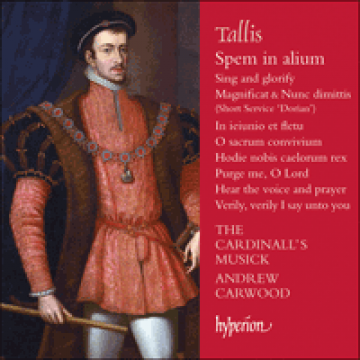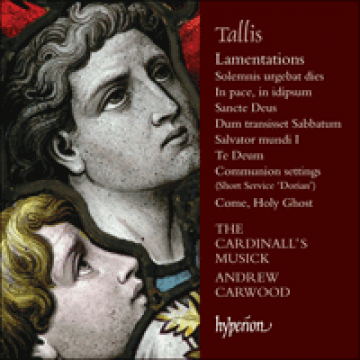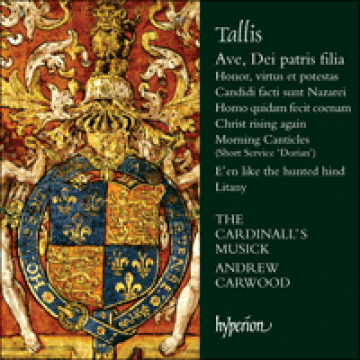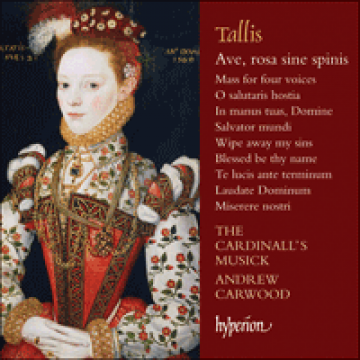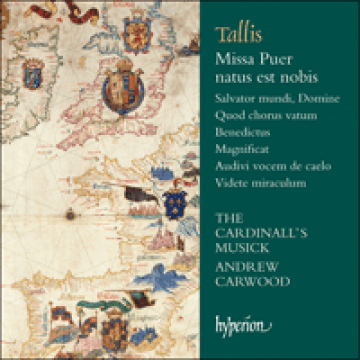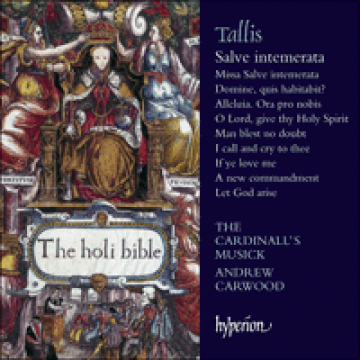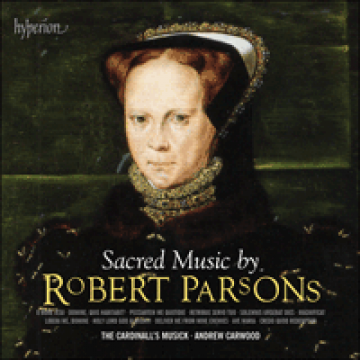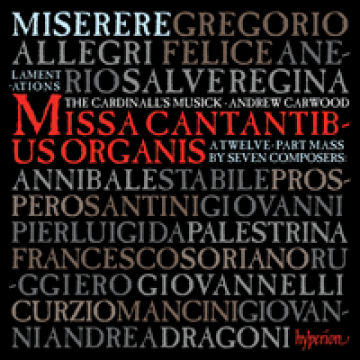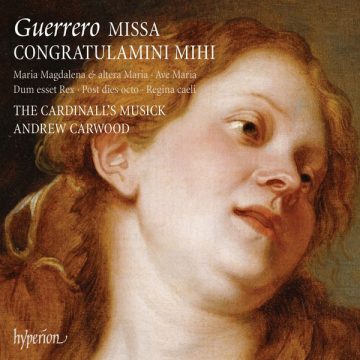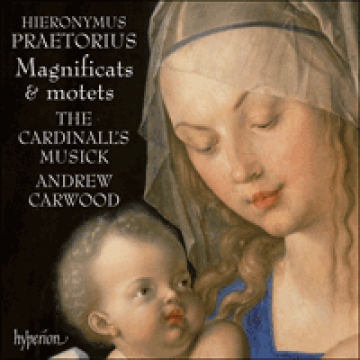Founded in 1989, The Cardinall's Musick is a highly successful and innovative ensemble, acclaimed worldwide for its award-winning recordings and expressive concert performances.
Taking its name from the 16th century English cardinal, Thomas Wolsey, the group’s reputation grew from its extensive study of music from the English Renaissance. Under the direction of Andrew Carwood, The Cardinall's Musick now embraces a wide range of styles and periods: from complete reconstructions of historical events to the world premieres of commissions from composers such as Michael Finnissy, Simon Whalley, Matthew Martin and Judith Weir.
A unique quality of The Cardinall’s Musick lies in the ability of its singers to perform as soloists within a seamless vocal team, “preserving their vocal personalities rather than striving for a mellifluous blend…resulting in a vibrant texture of timbres” (The Telegraph). Coupled with this are thoughtful programmes designed to stimulate and enlighten, to broaden horizons, and to bring a fresh approach to standard repertoire. It is for this dynamic, sincere sound and engaging programming that The Cardinall’s Musick has become renowned: “the voices of Andrew Carwood and his eight cohorts could probably start a blaze in the Antarctic!” (The Times).
The Cardinall’s Musick’s discography has received praise throughout the world and includes music by Nicholas Ludford, William Cornysh, Robert Fayrfax, Lassus, Palestrina and Victoria. They have won the Gramophone Award for Early Music no fewer than four times: in 1995, 2006, 2007 and 2010 for recordings of Fayrfax, Tallis and Byrd. The final volume of the group’s complete Latin works of William Byrd, Infelix ego, was named Recording of the Year at the 2010 Gramophone awards, only the second time an early music recording has won this prestigious prize. The Cardinall’s Musick has also received a French Diapason d’Or, a German Schallplatten Kritik Preis and a Schallplatten Echo Award.
The group has appeared at the most prestigious festivals and venues in the UK throughout Europe. They enjoy a close relationship and regular sold-out concerts at Wigmore Hall, London and have performed at festivals such as Spitalfields, Bath, Chester, Aldeburgh, the Three Choirs, and the South Bank. In 2015, The Cardinall’s Musick opened the BBC Proms Chamber Music series at Cadogan Hall with an extraordinary performance of Thomas Tallis’s 40-part motet Spem in alium and a world premiere by British composer Cheryl Frances-Hoad. Highlights in recent seasons include the ensemble’s debuts at the National Concert Hall, Dublin, and the Muziekgebouw aan ‘t IJ in Amsterdam.
This biography is for information only and should not be reproduced.
Byrd Masses, Wigmore Hall
(July 2023)
An outstanding celebration of William Byrd by The Cardinall’s Musick… The singers, throughout thoughtfully and ably directed by Andrew Carwood, certainly seemed to have found their own solution, as in the notably progressive three stages of the Kyrie, to the riddle of how to have the music sound both straightforward and complex. Words were always clear: crucial where there were many of them, not only in the Gloria and Credo, but also the Sequence, ‘Victimae paschali’. Detail was taken care of, as in the Offertory Terra remiuit et quievit’ and its earth trembling, without undue fuss.
Mark Berry, Seen and Heard International
Shriven and Forgiven: Music for Ash Wednesday, Wigmore Hall
(February 2021)
It was another Tallis work, however, that mesmerised me. In Miserere nostri Domine he weaves together three imitative canons simultaneously — a masterclass in close counterpoint. With the rich harmonies superbly sustained by the singers, the piece sounded remarkably minimalist and modern... In the complex Latin-texted works from the early 16th century, the clear, slightly hard-edged textures favoured by Carwood worked well. …No complaints, though, about the big work that ended the concert: Byrd’s Quomodo cantabimus, where these singers built towards a wonderful central climax. “How shall we sing the Lord’s song in a strange land?
Richard Morrison, The Times****
Singet dem Herren, Bath BachFest, Wiltshire Music Centre
(February 2021)
In the rich a cappella programme offered by exemplary vocal ensemble the Cardinall’s Musick, we met Johann Sebastian’s rarely encountered first cousin once removed, Johann Christoph, and his third cousin, Johann Ludwig, known as JL Bach, as well as JS himself.
Fiona Maddocks, The Guardian****
Gunpowder, Treason & Plot
Wigmore Hall, November 2019
the final monumental motet: Byrd’s 'Ad Dominum cum tribularer' – when I was in distress I called on the Lord. This heartfelt plea for truth in the face of lies and deceitfulness was emotionally devastating. The musical and dramatic contrasts, as eight parts wove miraculously distinct and as one, were breathtaking. We can only hope that the Cardinall’s Musick continue to examine and reanimate this repertoire for another thirty years.
Amanda-Jane Doran, Classical Source
'The Company of Heaven' - three-part series for 2018/19 season
Wigmore Hall
the differentiation of the individual lines, each sung with strong character, enabled Carwood to subtly highlight individual lines and phrases, which simultaneously injected muscularity into the evolving polyphony, with the brightness of the soprano and alto adding further ‘uplift’.
Claire Seymour, Opera Today [Part I]
It’s the tone that strikes you first with this ensemble. A trend towards ever whiter, narrower, purer sound from early music groups has given us some wonderfully gauzy, translucent, but sometimes rather wan performances, so it’s startling to hear such muscularity and full-voiced release. Just eight singers (sometimes shrinking down to a consort of four, five or six) set the dome above the Wigmore Hall stage ringing, refusing to let this lovely music settle into mere prettiness.
Alexandra Coghlan, The Tablet [Part I]
The eight singers who formed The Cardinall’s Musick on this occasion - some of whom are familiar figures from other ensembles such as The Tallis Scholars and The Sixteen - know this repertory and how to perform it like the proverbial back of the hand. But this no way lessens their attentiveness, expressivity and accomplishment. Rather - refreshingly so, in these days when we seem to be casting all continuity and cogency aside - I felt swept up in what one might call the comfort of tradition….Director Andrew Carwood achieved an excellent balance between a blended ensemble sound and highlights of colour, as individual voices came to the fore
Claire Seymour, Opera Today [Part II]
Tallis: The Votive Antiphons, Hyperion CDA68250
(released April 2018)
The Cardinall’s Musick and its conductor, Andrew Carwood, are specialists in this period and their performances combine individual vocal strengths (the voices are less uniform in timbre than with some other groups of their size) and a keen corporate sense of shaping. The performances have been issued individually before, but for those who want Tallis’s complete votive antiphons in one place this is a self-recommending disc.
Richard Fairman, The Financial Times****
'Fairest Isle' with O/Modǝrnt Chamber Orchestra
Wigmore Hall, April 2018
beautifully sung by The Cardinall’s Musick...The Cardinall’s Music gave precise and well-blended accounts of the Tavener (from the gallery), and the Gibbons. Particularly engaging, though, were their second-half renditions of three rarely-performed partsongs by Frank Bridge, to which they brought subtlety and intelligence to point up the pieces’ contrasting natures: the gentle pastorality of Autumn, the high-Victorian style of Music, when soft voices die and the busy wittiness of The Bee.
Barry Creasy, musicOMH
‘Thomas Tallis: Spem in Alium”, Hyperion CDA 68156
November 2016
Sooner or later in its excellent survey of Thomas Tallis’s a cappella choral works, the Cardinall’s Musick — as listed, 12 strong — was going to have to beef up to tackle the great 40-voice motet Spem in Alium. Here it is, and even amid rich and exalted company, it stands apart as something truly extraordinary.
James R Oestreich, New York Times, Best Classical Music Recordings of 2016
With Spem in alium (or, in its English guise, Sing and glorify), The Cardinall’s Musick conclude their Tallis explorations in style. The programming is on a par with the best instalments of the series: the placing of the lovely miniature God grant with grace just after the monumental Spem is very moving, and this In ieiunio is as fine an account of it as I can recall.
Fabrice Fitch, Gramophone
The pinnacles of this glorious disc are Thomas Tallis’s vast canvas – 40 independent voices – of Spem in alium, and a later version to an English text, Sing and glorify. […] Carwood moulds the structures to great effect, with wide-ranging dynamics from hushed groupings of eight voices to the full force. The remainder of the disc consists largely of Evensong from The Short Service, and includes the sublimely simple Tallis’s Canon, all beautifully crafted, and serving as a contract in scale and mood to the two versions of Tallis’s masterpiece
George Pratt, BBC Music *****
This Hyperion issue is another sure fire winner from Andrew Carwood and his outstanding choir… anyone who loves to wallow in the Great British choral tradition should not hesitate. I sense this could well be a potential award winner.
David Mellor, Classic FM
BBC Proms, Chamber Proms at Cadogan Hall
July 2016
How often do the streets of London throng with concert-goers demanding admission to a recital of Latin motets? Even for Sloane Square, the crowds hoping for a last-minute ticket to the sold-out Proms Chamber Music debut concert by The Cardinall’s Musick of Tallis and Cheryl Frances-Hoad’s world premiere were exceptional… this was an inspired programme and performance…. the ensemble was on superb form… when the singing is as good as this, it gives you the opportunity to savour individual lines… exceptionally precise, detailed and honest performances… this concert has set a standard for Chamber Proms that will be extremely difficult to sustain.
Matthew Wright, The Arts Desk
‘Thomas Tallis: Missa Puer natus est nobis’
Hyperion CDA 68026
It's sung here with customary perfection by the Cardinall’s Musick, who polish other Tallis gems alongside it, most notably Videte miraculum, a work of such sensuous beauty it quite eclipses the Mass.
Stephen Pritchard, The Observer
These photos are available to be downloaded.
Right click on a desired image and select the "Save Link As" option.
WAR & PEACE
In an uncertain world, a meditation on war and peace seems more necessary than ever. This programme brings the sixteenth century together with the modern age to look at how composers have reacted to difficult times. Including music by William Byrd from a time when religious controversy divided the nation it also highlights the music of the contemporary Scottish writer James Macmillan whose confident faith shines through his music. Here also is Benjamin Britten’s pointed criticism on the rise of the dictators in the 1930s and Arvo Pärt’s meditation following the Madrid bombings in 2004.
8: SATB x 2
Download
WILLIAM BYRD: THE ENGLISH CATHOLIC
William Byrd was the greatest English composer of the 16th century. His life spanned a period of huge political and religious upheaval through which he clung to his Catholic beliefs in spite of the repression of a reformed government. He composed throughout his long life, producing his most spritely and modern sounding music in his later years. It was surely his great abilities and the esteem in which he was held which allowed him to survive in Protestant England.
The first part of this programme is given over Byrd’s powerful Mass for Five Voices together with Gregorian chant and two motets from his 1591 collection. The second half explores Byrd’s works in English including two movements from his monumental ten-voiced Great Service (probably written in the 1590s for the Chapel Royal) and four pieces in English which are rarely performed. Byrd was a resolute Catholic but also a convinced Englishman and this programme allows an exploration of his unique position in 16th century society.
10: (SAATB) + Andrew Carwood
Download
IL SIGLO D’ORO
‘Il siglo d’oro’ – the Golden Age – was the name that Spaniards gave to their great flowering of music in the sixteenth. Spain brought forth some of the finest writers of the age and the Virgin Mary was a popular subject with all of them.
Francisco Guerrero was known as ‘el cantor de Maria’. Much of his highly characterful music was dedicated to the Virgin from well-crafted four-part pieces to the more splendid double choir numbers. This fascinating exploration of music from sixteenth century Spain sets Guerrero alongside his contemporaries and colleagues Morales, Esquivel, Vivanco, Alonso Lobo and the brightest star of all, Tomas Luis da Victoria.
9: 8 singers + Andrew Carwood
Download
KEEPING THE FAITH: TALLIS, BYRD & 16th CENTURY ENGLAND
Thomas Tallis and William Byrd, not only business partners and colleagues but also close friends and ones who shared a devotion to the Catholic world of early 16th century England. It is fitting therefore that they should share equal billing in this programme of Tudor music. The concert opens with Tallis' famous tune Why fum’th in fight which so captivated Ralph Vaughan Williams and led to the writing his Tallis Fantasia. Set against this simplicity is the opulent polyphony of his Missa Salve intemerata virgo and the antiphon of the same name. William Byrd propels the listener forward into the later sixteenth century with two stunning motets before his thoughtful and well-crafted set of Mass Propers for the Assumption of the Virgin - music almost certainly written for the now illegal Catholic services. Tribue Domine is a riot of energy and imagination as it celebrates the triumph of the Trinity.
ELIZABETH
Elizabeth I, one of the most famous and admired of English monarchs, died in 1603 after a life filled with trauma and success, trials and victories. This programme (introduced and narrated by Andrew Carwood) traces her remarkable life. The first half concerns the early years until her coronation in 1558. Here are the imposing characters of her father and mother, Henry VIII and Anne Boleyn, her brother and sister, Edward VI and Mary and her great ally Cardinal Pole, together with the story of the Reformation. Whilst in the second half is music concerned with her reign, celebrating the defeat of the Spanish Armada and the long list of Elizabeth’s suitors.
9: SSAATTBB 8 + Andrew Carwood
Download

